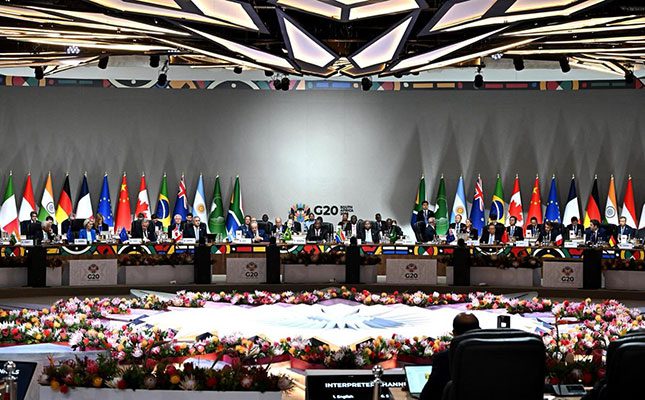
Yet the warm atmosphere inside the Nasrec venue stood in sharp contrast to the geopolitical frictions that shadowed the gathering.
Renewed commitment to multilateralism
Ramaphosa praised the leaders’ declaration adopted on Saturday, calling it evidence of the G20’s “renewed commitment to multilateral co-operation” and a recognition that shared global priorities must transcend political divides.
Brazil’s President Luiz Inácio Lula da Silva agreed, arguing that both the G20 summit and the recent COP30 climate conference hosted by Brazil prove that “multilateralism is alive and well.”
READ G20 Leaders’ Declaration: Impact on agriculture
But others were more circumspect. France’s President Emmanuel Macron warned that the G20 may be “reaching the end of a cycle,” telling journalists that geopolitical stalemate and the absence of key members threaten the forum’s ability to tackle global crises.
He also criticised elements of a new US proposal to end the war in Ukraine, which was discussed privately among European leaders, particularly provisions that would require Ukraine to scale down its military and accept Russian control over occupied areas.
Canadian Prime Minister Mark Carney offered a similarly sober assessment, describing the international moment as “a rupture, not a transition.”
He cautioned that countries are increasingly retreating into protectionist blocs. “Nostalgia is not a strategy,” he said, urging leaders to acknowledge the growing influence of emerging economies and the Global South.
Singaporean Prime Minister Lawrence Wong called for urgent reform of the global rules-based system, saying structures designed for a previous era no longer match current geopolitical and economic realities.
As global interdependencies become potential vulnerabilities, he warned, countries may feel pressured to turn inward — a shift that would ultimately undermine the entire system and disproportionately harm developing nations.
Praise for South Africa and a diplomatic rift with Washington
Turkey’s President Recep Tayyip Erdoğan praised South Africa for placing Africa at the centre of its G20 presidency and described the forum as indispensable to global co-operation. He also extended well wishes to the US, which will host the summit in 2026.
Ramaphosa said the final declaration “lays the foundation for solidarity,” urging leaders to “build the walls of justice and the roof of prosperity.”
READ Ubuntu: the only way to global food security?
But the White House took a more confrontational tone. Deputy press secretary Anna Kelly said President Donald Trump intends to “restore the legitimacy of the G20” when the US assumes the presidency, accusing South Africa of declining to facilitate a smooth handover at the summit’s close — a formality typically completed at the event.
South Africa countered that it would have breached diplomatic protocol by handing over the presidency to a junior US representative, as Washington sent only a chargé d’affaires. South Africa’s Minister Ronald Lamola of international relations said no formal US request had been received, but confirmed that Pretoria was open to conducting the handover at ambassadorial level at the Department of International Relations and Co-operation (DIRCO) headquarters.
Finance Minister Enoch Godongwana dismissed the controversy, emphasising that the transfer is ceremonial and that the US automatically becomes president on 1 December.
Government Communication and Information System (GCIS) chief director William Baloyi added that South Africa merely matched US representation “out of respect.”
Chrispin Phiri, spokesperson for DIRCO, argued that too much attention had been placed on US absenteeism rather than the substance of the G20 declaration, noting that Argentina endorsed the document despite its own reservations.
Responding to speculation that South Africa might be sidelined in future gatherings, Baloyi stressed that the country remains a permanent participant. “We cannot dictate who is invited, but South Africa is a permanent member,” he said.
China’s financial support confirmed
Deputy President Paul Mashatile confirmed that China provided financial assistance for hosting the summit, including R5,34 million for the DIRCO and R36,8 million in support of the presidency and leaders’ summit.
After meeting Chinese Premier Li Qiang on Sunday, Mashatile said both countries reaffirmed their commitment to deepen co-operation in trade, investment, manufacturing, renewable energy and digital industries.
He emphasised South Africa’s push to grow value-added exports and integrate more local businesses into Chinese and global supply chains.
A symbolic close
In the summit’s final moments, Ramaphosa raised his wooden Ndebele-beaded gavel, which under normal circumstances would have been handed to the next host, and declared that the G20 presidency “now passes to the United States, where we will see each other next year.”
Get trusted farming news from Farmers Weekly in Google Top Stories.
➕ Add Farmers Weekly to Google ✔ Takes 10 seconds · ✔ Remove anytime





